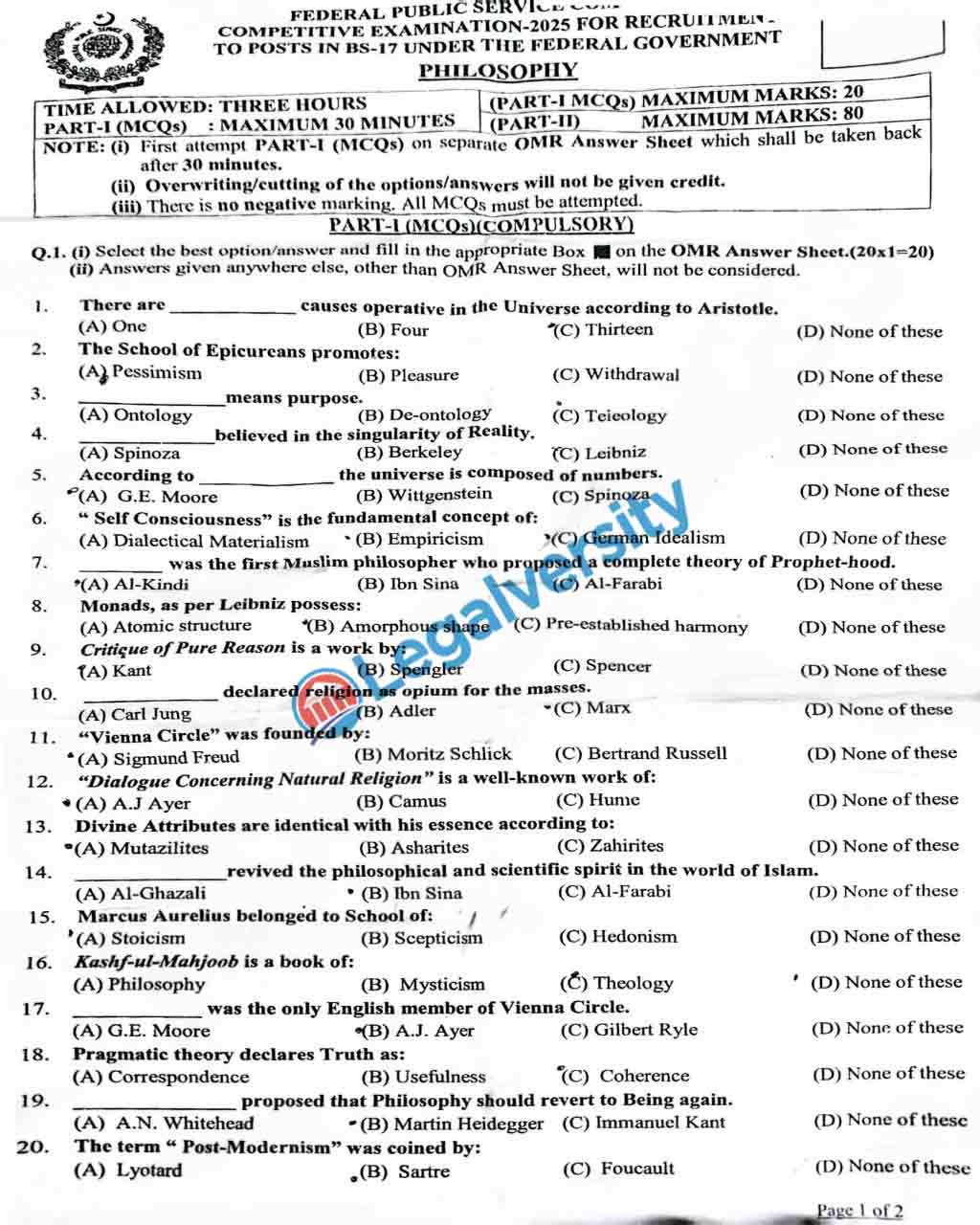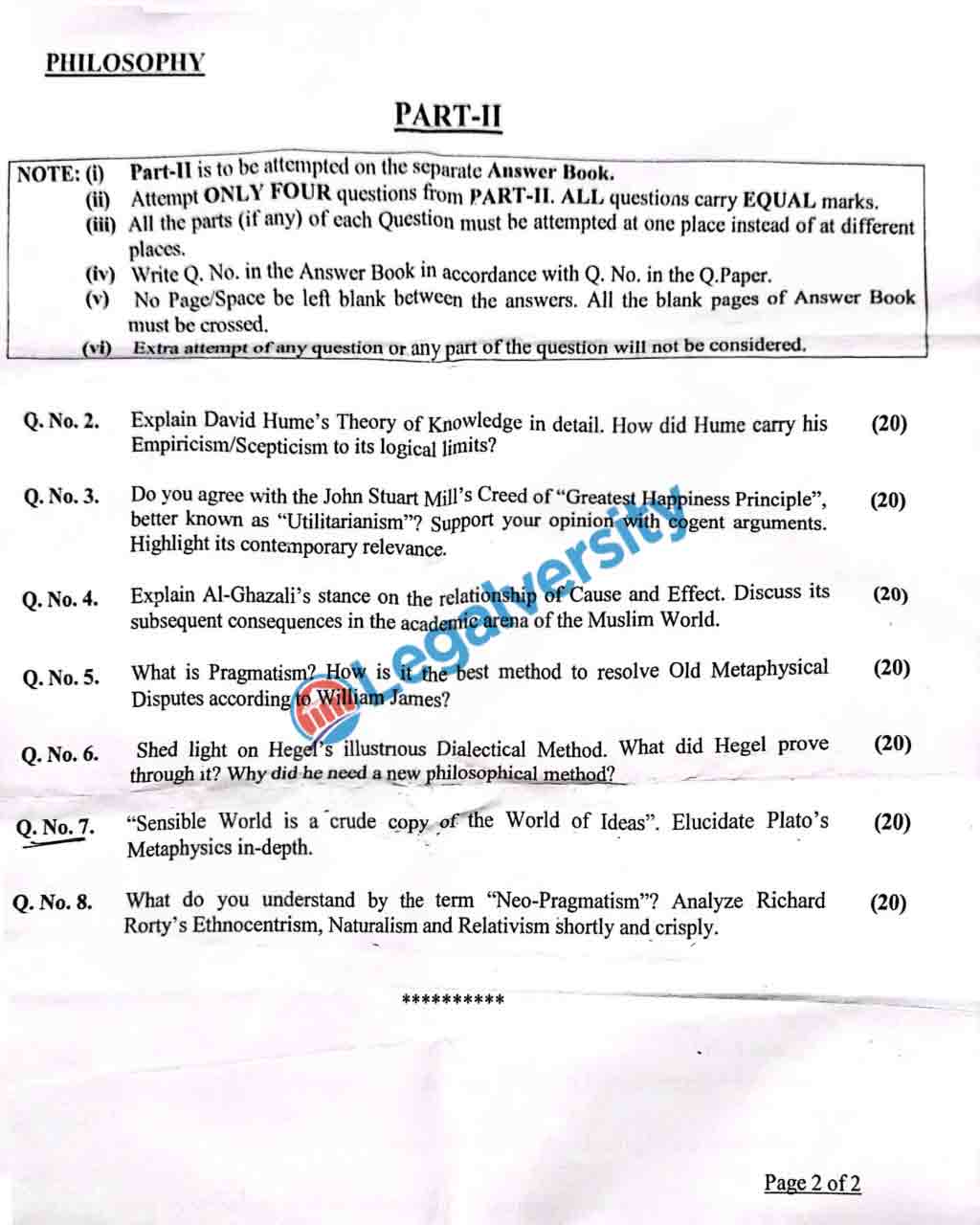The paper on Philosophy is optional in the CSS competitive examination 2025. Here, you will find the CSS Philosophy past Paper 2025.
CSS Philosophy Past Paper 2025
Q1. Explain David Hume’s theory of knowledge in detail. How did Hume carry his empiricism/skepticism to its logical limits?
Q2. Do you agree with John Stuart Mill’s Creed of “Greatest Happiness Principle”, better known as “Utilitarianism”? Support your opinion with cogent arguments. Highlight its contemporary relevance.
Q3. Explain Al-Ghazali’s stance on the relationship of cause and effect. Discuss its subsequent consequences in the academic arena of the Muslim world.
Q4. What is pragmatism? How is it the best method to resolve old metaphysical disputes according to William James?
Q5. Shed light on Hegal’s illustrious Dialectical method. What did Hegel prove through it? Why did he need a new philosophical method?
Q6. “Sensible World is a crude copy of the World of Ideas”. Elucidate Plato’s Metaphysics in depth.
Q7. What do you understand by the term “Neo-Pragmatism”? Analyze Richard Rorty’s Ethnocentrism, Naturalism, and Relativism briefly and crisply.
Critical Evaluation of the Paper
This essay in philosophy is firmly a conceptual and analytical exercise, demanding a sound grasp of classical and contemporary philosophical theory. Questions demand a critical examination of epistemology, ethics, metaphysics, and pragmatism, demanding historical context and contemporary applicability in answers.
The first question tests David Hume’s theory of knowledge, which is empiricism and skepticism. The candidates need to explain how Hume opposed the idea that we are born with ideas, saying that knowledge comes only from experience (impressions and ideas). His skepticism is strongest in his refusal of causality as something obligatory, saying that causal connections are habits of the mind, not real facts. The response needs to evaluate Hume’s strong empiricism, which led him to question even the self and the external world, leaving a great philosophical challenge to later philosophers like Kant to overcome.
The second question analyzes John Stuart Mill’s Utilitarianism, specifically the Greatest Happiness Principle—that acts are right if they create happiness and reduce pain. Candidates are required to have a clear position, defending or criticizing Mill’s moral theory. A defending argument could illustrate how it helps in modern democratic policies, legal reforms, and human rights movements. A criticism could point out its overlook of individual rights, long-term justice, and different types of happiness. The answer must also explain how utilitarianism is practiced in modern ethics, e.g., AI decision-making, economic policies, and social justice.
The third question analyzes Al-Ghazali’s rejection of causality, declaring that events are caused by God’s will instead of strict natural laws. His argument, as described in The Incoherence of the Philosophers, contradicted Aristotelian causation and sparked huge debates in Islamic philosophy. Candidates must analyze how his ideas influenced later Islamic thought, specifically in the decline of rationalist philosophy in favor of theological determinism, and how scholars like Averroes (Ibn Rushd) reacted to his criticisms.
The fourth question asks you to study William James’ pragmatism, which is the belief that truth is what works in everyday life. The candidates ought to explain how James suggested pragmatism as a way of ending long-standing philosophical disputes because it does not hold in absolute truths but in ideas that have real-world effects. A good answer will emphasize James’ contribution to modern ways of solving issues, especially in science, ethics, and political arguments.
The fifth question is about Hegel’s Dialectical Method, which demonstrates how history and reality evolve with time through thesis, antithesis, and synthesis. Candidates must describe why Hegel developed this method, that is, to resolve contradictions in human concepts and history. A good response should demonstrate how Hegel’s dialectic influenced other researchers such as Karl Marx, whom he employed for historical materialism.
The sixth question examines Plato’s Metaphysics, specifically his Theory of Forms. By this theory, the world we see is an imperfect copy of a higher world of eternal Ideas. The response should explain how the theory explains knowledge, reality, and the way human beings perceive things, and Plato’s preference for rationalism over empiricism. The candidates should explain what this implies for contemporary philosophy, particularly in debates about abstract objects and idealism. The seventh question asks about Neo-Pragmatism, with the inclusion of Richard Rorty’s critique of standard epistemology. He would vindicate ethnocentrism, naturalism, and relativism in their stead. Opponents must consider Rorty’s criticism of objectivity, his theory of society as a construction, and what his opinions mean for political and cultural discourse today.
Last Check This paper requires intensive thought, sound reasoning, and the ability to bring ancient theory to modern arguments. Candidates should not just explain theory, but also look at what it is, its positives, and its negatives. Top marks will include background facts, comparisons, and examples from everyday life, demonstrating a good grasp of philosophical problems.
View the CSS Philosophy past paper 2025


Also read:
